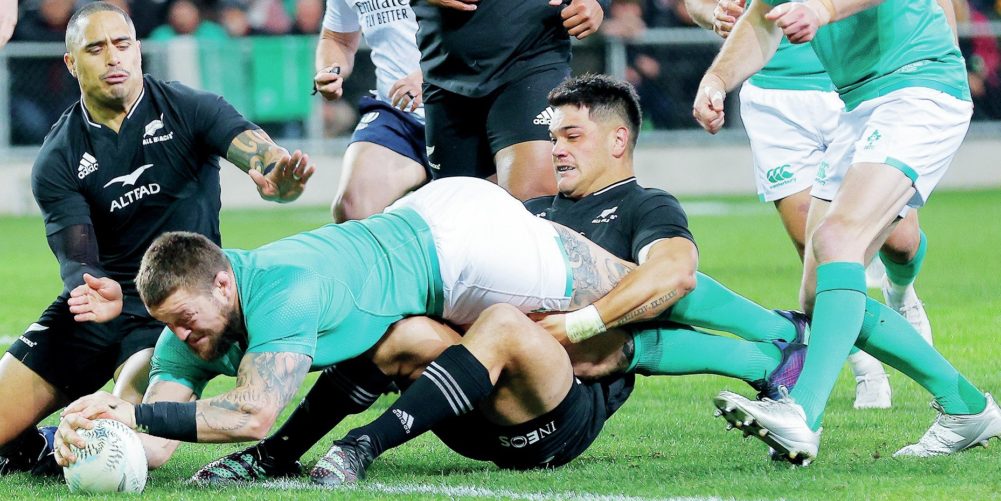Ireland resist injuries to go unchanged against New Zealand

Ireland have overcome several knocks to name an unchanged XV against New Zealand for potentially the highest octane quarter-final in Rugby World Cup history.
Ireland’s metronomic rise to the summit of the world rankings has been typified by their changing fortunes against the All Blacks. An underwhelming loss to Argentina to continue their quarterfinal curse in 2015 prompted a reset in the Irish system, and their statement to suggest as much was a first ever win against New Zealand in the fixture’s 111 year history.
Despite another loss to the Kiwis later that year in 2016, Ireland staked their claim as genuine World Cup threats for the first time in their history as they physically dominated New Zealand in Dublin in Autumn 2018.
However, this threat was brutally suppressed when Ireland and New Zealand met in the quarterfinals in 2019. The fixture itself was unexpected as Ireland laboured through the pool stages in second place to rampant hosts Japan. It was said the All Blacks had one hand on the trophy after they decimated the Irish 46-14.
Since then under Andy Farrell Ireland have assumed the role of the ruthless, bludgeoning, mechanic favourites of the tournament, with a series win in New Zealand last year affirming that status. With France‘s simultaneous rise, this quarter-final has been planted in most rugby fans’ diaries for a long time.
It was a classic Steve Hansen performance in the quarters four years ago. Since then, Ian Foster has presided over a turbulent time – nothing to epitomise that more than a rare home series loss to Ireland – and his selection for tomorrow’s game represents a subversion of the tactics that have served New Zealand so well in World Cups gone by.
All Blacks legend Sean Fitzpatrick recently said New Zealand’s squad that played Italy was New Zealand’s strongest 23 on The Rugby Paper Podcast, but Foster has made six changes to the squad, and 11 from the 23 that faced France in their enticing tournament opener.
Mark Telea’s three tries against France and Italy were not sufficient a distraction from off-field disciplinary issues that have cost him his place. Leicester Fainga’anuku is the beneficiary having scored a hat trick against Uruguay last week.
Elsewhere in the backs, Finlay Christie is a shock inclusion as bench scrum half over tournament standout Cam Roigard.
Perhaps the prospect of Roigard closing out the game was not conservative enough for Foster, especially since Damian McKenzie, whose flair performances have lit up the tournament, is playmaker cover.
Meanwhile, in the forwards, 150-cap man Sam Whitelock remains on the bench whilst captain Sam Cane returns to the starting lineup, relinquishing Ardie Savea of leadership duty. A much changed front row sees Ethan de Groot return from suspension.
His interim, Ofa Tu’ungafasi drops out of the squad completely. So too does Nepo Laulala for Tyrel Lomax, despite having started three games so far at tighthead. Tamaiti Williams and Fletcher Newell, therefore, will be tasked with attacking one of Ireland’s few perceived week spots, their prop cover.
Andrew Porter has amassed 212 out of 320 potential minutes so far, including 74 minutes against South Africa. Whilst Finlay Bealham has excelled as cover for Tadhg Furlong, loosehead Dave Kilcoyne hasn’t been trusted in tight games and Ronan Kelleher was dropped to the bench at the first chance with a sub par lineout record so far. The set piece battle in the game’s last quarter, should neither side have run away with it by this point, could be decisive.
Mack Hansen and James Lowe have both overcome injuries sustained last week against Scotland to ensure their starting lineup remains unchanged. However, last week’s formidably experienced bench is forced to give Joe McCarthy and Jimmy O’Brien baptisms of fire.
McCarthy is the youngest player in the squad aged 22 and faces the unenviable task of replacing vice-captain James Ryan who has succumbed to a recurring wrist injury.
Meanwhile, back three player O’Brien is the only player to not have featured so far, and the knocks to both wingers mean he is preferred to centre Stuart McClosky.
Foster has thrown caution to the wind to the key tenet of selection consistency that has defined successful All Blacks teams in the past. Meanwhile, Farrell has trusted the same set of players for the third game in a row. Ireland have been New Zealand’s bogey team in the last four years, whilst the quarterfinals have been Ireland’s inescapable burden.
Will their generational team overcome a history of torment, or will their fatigue open the door for the All Blacks to repeat 2019’s triumph? The Stade de France will play host to what will surely be a classic.
IRELAND: Keenan; Hansen, Ringrose, Aki, Lowe; Sexton (capt), Gibson-Park; Porter, Sheehan, Furlong, Beirne, Henderson, O’Mahony, Van der Flier, Doris.
Replacements: Kelleher, Kilcoyne, Bealham, McCarthy, Conan, Murray, Crowley, O’Brien
NEW ZEALAND: B Barrett; Jordan, Ioane, J Barrett, Fainga’anuku; Mo’unga, Smith; De Groot, Taylor, Lomax, Retallick, S Barrett, Frizell, Cane, Savea.
Replacements: Coles, Williams, Newell, Whitelock, Papali’i, Christie, McKenzie, Lienert-Brown
Written by Tom Jeffreys
For exclusive stories and all the detailed rugby news you need, subscribe to The Rugby Paper website, digital edition, or newspaper from as little as 14p a day.